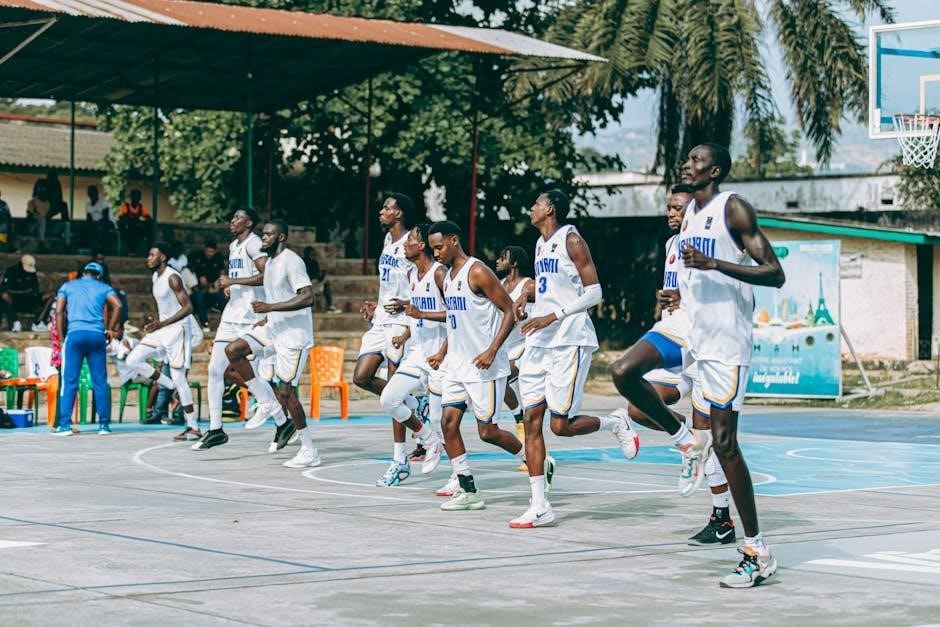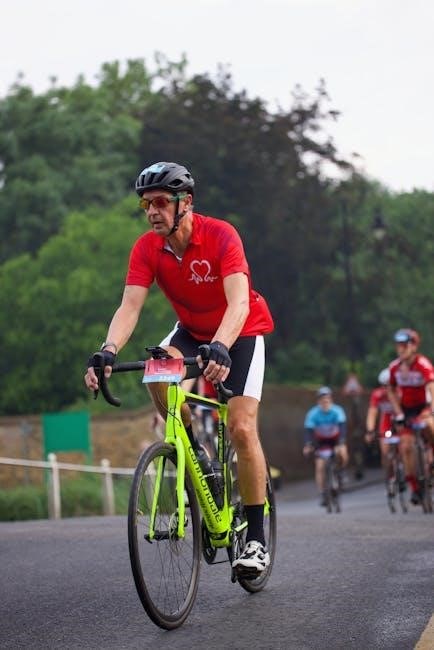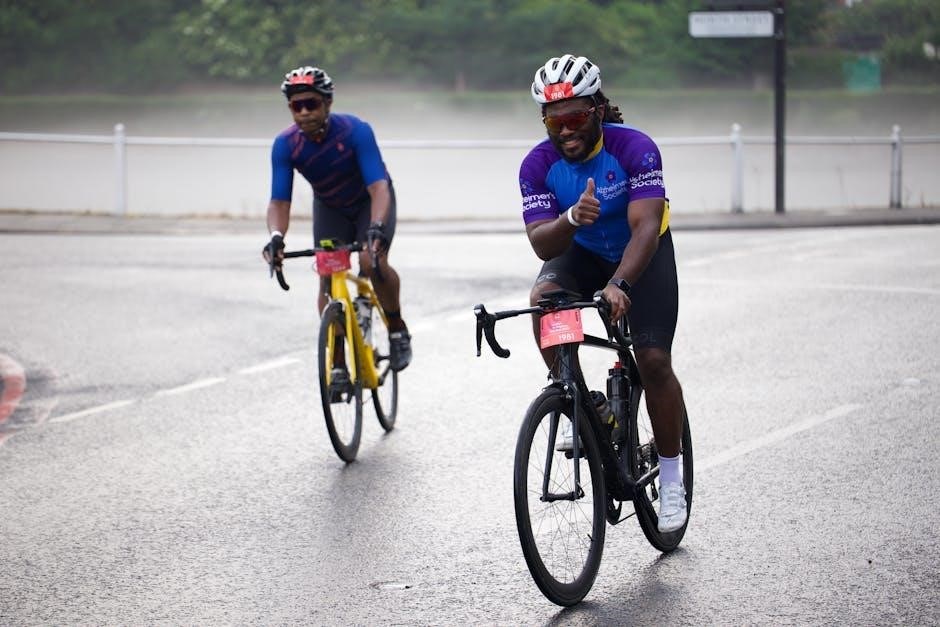Sport and Exercise Psychology explores the psychological factors influencing physical activity, performance, and health. It connects psychology with sport, exercise, and human movement to enhance well-being and achievement.
1.1 Definition and Scope
Sport and Exercise Psychology is the scientific study of psychological factors impacting physical activity, performance, and health. It examines how mental processes influence behavior, motivation, and emotional states in sports and exercise. The scope extends to understanding individual differences, team dynamics, and environmental factors affecting performance and well-being. This field integrates theory and practice to optimize human potential in physical activities, addressing diverse populations, from elite athletes to recreational exercisers, aiming to enhance enjoyment, achievement, and overall health.
1.2 Importance of Sport and Exercise Psychology
Sport and Exercise Psychology is crucial for enhancing performance, overcoming challenges, and improving mental health. It helps athletes develop resilience, manage stress, and maintain motivation. By understanding psychological factors, individuals can optimize their physical activity, recover from injuries, and adhere to exercise routines. This field also promotes overall well-being by addressing mental health issues and fostering a positive mindset toward physical activity. Its applications are vast, benefiting athletes, coaches, and the general population aiming to improve their quality of life through exercise and sport.
1.3 Historical Development
The historical development of Sport and Exercise Psychology traces back to ancient philosophers like Aristotle and Plato, who linked physical activity to mental well-being. In the late 19th and early 20th centuries, the field began to take shape with early psychological studies on human performance. Key figures like William James contributed foundational ideas. The mid-20th century saw the rise of concepts like “mental toughness” and the development of techniques such as visualization. The establishment of organizations like the International Society of Sport Psychology in the latter half of the 20th century marked the formalization of the field, leading to the organized discipline we recognize today.

Core Concepts in Sport and Exercise Psychology
Sport and Exercise Psychology focuses on mental processes, behaviors, and emotional states that influence physical activity and performance. Key concepts include motivation, confidence, anxiety, and goal-setting.
2.1 Motivation and Goal Setting
Motivation is a critical driver of behavior and performance in sports and exercise. It can be intrinsic, driven by personal satisfaction, or extrinsic, influenced by external rewards. Goal setting is a powerful tool that enhances motivation by providing clear targets. Research shows that specific, measurable, and attainable goals improve focus and persistence. Understanding individual differences in motivation and tailoring goal-setting strategies can optimize performance and adherence to exercise programs. Aligning goals with personal values and interests further strengthens commitment and overall achievement.
2.2 Confidence and Self-Efficacy
Confidence and self-efficacy are essential psychological constructs in sport and exercise psychology. Confidence refers to an individual’s belief in their ability to succeed, while self-efficacy is the belief in one’s capacity to perform specific tasks. Both influence motivation, persistence, and performance. High levels of confidence enhance resilience and adaptability under pressure. Self-efficacy, as theorized by Bandura, is shaped by past experiences, observational learning, and social interactions. Strengthening these constructs through positive feedback, mastery experiences, and realistic goal-setting can significantly improve athletic and exercise outcomes, fostering a mindset of competence and achievement.
2.3 Anxiety and Stress in Sports
Anxiety and stress are common experiences in sports, often arising from competitive pressure, fear of failure, or high expectations. While mild anxiety can enhance focus, excessive levels impair performance and decision-making. Stress can lead to physical symptoms like muscle tension and sleep disturbances. Athletes may use relaxation techniques, cognitive restructuring, and mindfulness to manage these challenges. Understanding the sources and effects of anxiety and stress is crucial for developing interventions to optimize mental well-being and performance. Coaches and psychologists play a key role in fostering resilience and adaptive coping strategies.

Theoretical Foundations
Theoretical foundations provide frameworks for understanding behavior, motivation, and performance in sports, offering insights into psychological processes that enhance athletic and physical activities.
3.1 Cognitive-Behavioral Theory
Cognitive-behavioral theory examines how thoughts, feelings, and actions interact to influence behavior. In sports, it helps athletes identify and modify negative thought patterns to improve performance and emotional resilience. By addressing unhelpful beliefs and behaviors, individuals can develop more adaptive coping strategies. This theory is widely applied in intervention programs to enhance mental toughness, reduce anxiety, and foster a positive mindset. Its practical approach makes it a cornerstone in sport psychology, enabling athletes to overcome psychological barriers and achieve their full potential.
3.2 Self-Determination Theory
Self-Determination Theory (SDT) focuses on intrinsic motivation, emphasizing autonomy, competence, and relatedness as key drivers of behavior. In sports, SDT suggests that athletes perform best when their basic psychological needs are met. Autonomy involves feeling in control, competence relates to mastery, and relatedness is about connection with others. When these needs are satisfied, individuals are more likely to engage in sustained and enjoyable physical activity. SDT provides a framework for understanding motivation and promoting long-term participation in exercise and sport.
3.3 Social Learning Theory
Social Learning Theory posits that individuals acquire behaviors by observing and imitating others. In sports, athletes learn skills and strategies by watching coaches, teammates, or elite performers. The theory emphasizes the role of observation, imitation, and reinforcement in shaping behavior. It suggests that confidence and motivation can be developed through observing successful models and receiving positive feedback. This theory is widely applied in sport psychology to enhance performance, promote exercise adherence, and foster a positive sporting environment by leveraging observational learning and social interactions.
Key Components of Sport and Exercise Psychology
Sport and Exercise Psychology examines the psychological elements influencing performance and well-being. Key components include personality traits, emotional regulation, and team dynamics, which collectively shape athletic success and mental health.
4.1 Personality and Sport Performance
Personality traits significantly influence an athlete’s behavior, decision-making, and performance in sports. Traits like conscientiousness, openness, and extraversion often predict success, as they foster discipline, creativity, and teamwork. Individual differences in personality can shape how athletes respond to pressure, adapt to strategies, and interact with teammates; For instance, high neuroticism may lead to increased anxiety, while self-confidence can enhance resilience. Understanding these psychological characteristics helps coaches tailor training and communication, optimizing individual and team outcomes. Personality assessments are increasingly used to identify talent and improve team dynamics, making it a vital aspect of sport psychology.
4.2 Emotional Regulation in Sports
Emotional regulation is crucial for athletes to manage stress, anxiety, and arousal during competition. Techniques like mindfulness, breathing exercises, and cognitive restructuring help athletes maintain focus and composure. Positive emotions, such as excitement and confidence, can enhance performance, while negative emotions, like fear or anger, may hinder it. Effective emotional regulation strategies enable athletes to adapt to high-pressure situations, fostering resilience and consistency. Coaches often incorporate mental training to improve emotional control, ensuring athletes perform at their best under challenging conditions.
4.3 Team Dynamics and Communication
Team dynamics and communication are essential for fostering collaboration and success in sports. Trust, cohesion, and clear communication among teammates enhance coordination and motivation. Effective communication helps clarify roles, resolve conflicts, and build a positive group culture. Coaches play a key role in promoting open dialogue and encouraging feedback. Strong team dynamics also improve problem-solving and adaptability during competitions. By cultivating a supportive environment, teams can maximize collective performance and achieve shared goals. Poor communication, however, can lead to misunderstandings and decreased morale, emphasizing its importance in sports settings.
Practical Applications in Sports
Practical applications of sport psychology focus on enhancing performance, optimizing mental strategies, and promoting athlete well-being. Techniques like goal-setting and stress management help improve team cohesion, resilience, and overall success.

5.1 Enhancing Athletic Performance
Enhancing athletic performance involves understanding mental and physical factors that influence success. Techniques like visualization, goal-setting, and self-talk help athletes prepare mentally. Emotional regulation and confidence-building strategies enhance focus and resilience during competitions. Additionally, team dynamics and communication play a crucial role in optimizing group performance. Sport psychologists work with athletes to develop personalized strategies, addressing individual needs and fostering a growth mindset. These interventions aim to maximize potential, ensuring athletes perform at their best while maintaining mental well-being and long-term success.
5.2 Injury Rehabilitation and Mental Recovery
Injury rehabilitation requires a holistic approach, addressing both physical and psychological aspects. Mental recovery is crucial, as injuries often lead to emotional challenges like frustration, anxiety, and fear of re-injury. Sport psychologists use interventions such as counseling, mindfulness, and goal-setting to help athletes cope with setbacks and regain confidence. A supportive environment, clear communication, and education on the recovery process also play key roles. Effective mental recovery strategies ensure athletes return to their sport with resilience, readiness, and a positive mindset, promoting long-term performance and well-being.
5.3 Coaching and Leadership Styles
Coaching and leadership styles significantly influence athlete performance and team dynamics. Effective coaches adapt their styles to meet team needs, fostering motivation and collaboration. Autocratic, democratic, and transformational leadership approaches shape athlete behavior and satisfaction. A coach’s ability to communicate, set goals, and provide feedback is crucial. Positive leadership fosters resilience, trust, and accountability, while negative styles may hinder performance and morale. Understanding leadership dynamics helps coaches optimize their approach, creating a supportive environment that enhances both individual and team success in sports and exercise settings.

Exercise Psychology and Physical Activity
Exercise psychology examines the psychological factors driving physical activity, focusing on motivation, behavior, and mental health outcomes. It aims to understand and promote lifelong engagement in exercise.
6.1 Exercise Adherence and Compliance
Exercise adherence refers to the consistency with which individuals engage in physical activity, while compliance involves following prescribed exercise regimens. Understanding these concepts is crucial for promoting long-term health and well-being. Psychological factors such as motivation, self-efficacy, and goal-setting significantly influence adherence. Barriers like lack of time, motivation, or access to facilities can hinder compliance. Interventions such as personalized plans, social support, and positive reinforcement can enhance adherence rates. Improving adherence is key to achieving sustained physical activity and its associated health benefits.
6.2 Mental Health Benefits of Exercise
Exercise has profound benefits for mental health, reducing symptoms of anxiety, depression, and stress. Physical activity promotes endorphin release, improving mood and emotional well-being. It enhances cognitive function, boosting concentration and memory. Regular exercise fosters resilience, helping individuals cope with adversity. Additionally, it provides opportunities for social interaction, reducing feelings of isolation. Overall, exercise is a powerful tool for maintaining mental health, contributing to a balanced and fulfilling life.
6.3 Promoting Physical Activity in Different Populations
Promoting physical activity requires tailored approaches for diverse populations, including children, adults, elderly, and those with disabilities. Strategies must address barriers such as accessibility, motivation, and cultural beliefs. Community-based initiatives, educational programs, and policy support are essential. Encouraging active lifestyles in various settings, like schools and workplaces, can significantly increase participation. Additionally, leveraging technology and social media can inspire engagement. Understanding individual needs and preferences ensures interventions are effective and inclusive, fostering lifelong physical activity habits across all demographic groups.

Research Methods in Sport and Exercise Psychology
Research methods in sport and exercise psychology include experimental, observational, and mixed-design studies. Data collection involves surveys, interviews, and physiological measurements to understand behavior, performance, and well-being.
7.1 Quantitative Research Methods
Quantitative research methods in sport and exercise psychology involve numerical data collection and statistical analysis. Techniques include experiments, surveys, and longitudinal studies to measure variables like performance, motivation, and recovery. These methods allow for objective, generalizable findings, enabling researchers to identify patterns and predict outcomes. Advanced statistical tools, such as regression and factor analysis, are used to interpret data. This approach is essential for understanding the psychological factors that influence physical activity and athletic performance, providing a foundation for evidence-based interventions.
7.2 Qualitative Research Methods
Qualitative research methods in sport and exercise psychology focus on understanding experiences, perceptions, and meanings through non-numerical data. Techniques include interviews, focus groups, and case studies to explore athletes’ and exercisers’ thoughts and feelings. These methods provide in-depth insights into psychological processes, such as motivation, emotional states, and social interactions. By capturing rich, detailed narratives, qualitative approaches complement quantitative studies, offering a deeper understanding of complex psychological phenomena in sport and exercise settings. This approach is particularly valuable for exploring individual and contextual factors.
7.3 Mixed-Methods Approaches
Mixed-methods approaches combine quantitative and qualitative research to provide a comprehensive understanding of psychological phenomena in sport and exercise. These methods integrate numerical data with rich, descriptive insights, offering a holistic perspective. Techniques include sequential designs, where one method informs the other, and concurrent designs, where both are conducted simultaneously. Mixed-methods research is particularly useful for exploring complex issues, such as the interplay between motivation and performance or the psychological impact of injury. This approach enhances validity and depth, addressing research questions from multiple angles effectively.

Professional Ethics in Sport and Exercise Psychology
Professional ethics in sport and exercise psychology emphasize respect, integrity, and responsibility. They guide practitioners to prioritize clients’ well-being, maintain confidentiality, and adhere to ethical guidelines in all interactions.
8.1 Confidentiality and Privacy
Confidentiality and privacy are cornerstone ethical principles in sport and exercise psychology. They ensure that personal information shared by clients is protected and accessed only with consent. Practitioners must adhere to legal and professional standards, safeguarding sensitive data. This fosters trust and a secure environment for open communication. Breaches of confidentiality can damage therapeutic relationships and violate ethical codes. Proper storage, secure transmission, and clear client agreements are essential practices. Exceptions, such as risk of harm, must be handled with care and transparency to maintain ethical integrity.
8.2 Informed Consent and Ethical Practice
Informed consent is a fundamental ethical requirement in sport and exercise psychology, ensuring clients are fully aware of procedures, benefits, and risks. Ethical practice involves adhering to moral standards, protecting clients’ rights, and maintaining professional integrity. Practitioners must ensure transparency, understanding, and voluntariness when obtaining consent. Ethical guidelines also emphasize honesty, respect for autonomy, and minimizing harm. Breaches can lead to legal and professional repercussions, underscoring the importance of adhering to established codes of conduct and staying informed about evolving ethical standards in the field.
8.3 Cultural Competence in Sport Psychology
Cultural competence in sport psychology requires practitioners to understand and respect diverse cultural backgrounds, values, and beliefs. It involves adapting interventions to meet the unique needs of individuals from varied cultural contexts. Cultural differences can influence communication styles, motivational factors, and perceptions of performance. Practitioners must be aware of their own biases and develop cross-cultural awareness to build trust and deliver effective support. Ignoring cultural factors can lead to misinterpretation of behaviors and ineffective interventions, emphasizing the importance of culturally sensitive practice in optimizing outcomes for diverse populations.
Emerging Trends in Sport and Exercise Psychology

Emerging trends include integrating technology, mindfulness practices, and neuroscience to enhance performance and well-being. These innovations are reshaping how psychologists approach athlete development and mental health support.
9.1 Technology and Virtual Reality in Training
Technology and virtual reality (VR) are revolutionizing sport and exercise training. VR creates immersive, realistic environments for athletes to practice and refine skills without physical strain. Wearable devices and apps track performance metrics, providing instant feedback. These tools enhance mental preparation, focus, and resilience. VR also aids in rehabilitation by simulating challenging scenarios safely. The integration of technology personalizes training, making it more engaging and effective. This trend is transforming how athletes train, recover, and prepare mentally for competition, offering innovative solutions to traditional challenges in sport psychology.
9.2 Mindfulness and Meditation in Sports
Mindfulness and meditation are increasingly used in sports to enhance mental clarity, focus, and emotional regulation. These practices help athletes manage stress, anxiety, and pressure, fostering resilience. By cultivating present-moment awareness, athletes can improve concentration, decision-making, and overall performance. Meditation also supports recovery by reducing muscle tension and promoting relaxation. Research shows mindfulness interventions can enhance flow states, boosting both mental and physical performance. These tools are becoming essential for athletes seeking a competitive edge and improved well-being in their careers.
9.3 The Role of Neuroscience in Sport Psychology
Neuroscience is revolutionizing sport psychology by uncovering how the brain influences athletic performance, decision-making, and emotional regulation. Advanced neuroimaging techniques, like fMRI, reveal neural mechanisms behind motor skills and cognitive processes. Understanding brain plasticity helps athletes adapt to challenges and recover from injuries. Neuroscience also explores the neural basis of motivation, focus, and stress management, enabling tailored interventions. By integrating neuroscientific insights, sport psychologists can enhance performance, improve mental resilience, and optimize training strategies for athletes at all levels.
Case Studies and Practical Examples
Case studies and practical examples provide real-world insights into applying sport psychology principles, helping professionals and athletes understand and implement effective psychological techniques in various sports scenarios.
10.1 Successful Applications of Sport Psychology
Sport psychology has been instrumental in enhancing athletic performance, improving mental resilience, and fostering team cohesion. Techniques like mindfulness, visualization, and goal-setting have empowered athletes to achieve peak performance. Real-world examples include elite athletes overcoming pressure to win championships and teams using psychological strategies to improve communication and trust. These applications highlight how sport psychology translates theoretical concepts into practical, measurable outcomes, benefiting both individual athletes and organizational success in sports.
10.2 Overcoming Challenges in Exercise Psychology
Exercise psychology addresses barriers to physical activity, such as low motivation, inconsistent participation, and negative experiences. Strategies like goal-setting, feedback, and social support help individuals overcome these challenges; For instance, setting realistic goals can enhance adherence, while positive reinforcement boosts motivation. Additionally, understanding personal barriers and developing coping strategies fosters long-term engagement in exercise. These approaches empower individuals to maintain active lifestyles, promoting physical and mental well-being despite initial obstacles.
10.3 Real-World Examples of Psychological Interventions
Psychological interventions in sport and exercise settings include techniques like cognitive-behavioral therapy (CBT) to address performance anxiety and mindfulness practices to enhance focus. For example, athletes may use visualization to improve performance under pressure, while exercisers might employ goal-setting strategies to maintain consistency. Additionally, team-based interventions, such as communication training, can foster cohesion and reduce conflict. These practical applications demonstrate how psychological principles can be tailored to real-world scenarios, promoting both performance and mental well-being in various contexts.
Resources and Further Reading
Key resources include textbooks like “Foundations of Sport and Exercise Psychology” and journals such as the Journal of Sport and Exercise Psychology. Online courses and professional organizations like AASP provide further learning opportunities.
11.1 Recommended Textbooks and Journals
Essential textbooks include “Foundations of Sport and Exercise Psychology” by Weinberg and Gould, offering comprehensive insights into motivation, anxiety, and team dynamics. Journals like the Journal of Sport and Exercise Psychology provide cutting-edge research on psychological aspects of physical activity. These resources are vital for students, researchers, and practitioners seeking evidence-based knowledge and practical applications in the field of sport and exercise psychology.
11.2 Online Courses and Workshops
Online courses and workshops are essential resources for learning sport and exercise psychology. Platforms like Coursera, edX, and Udemy offer courses on motivation, confidence, and stress management. Workshops often focus on practical skills, such as goal setting and emotional regulation. These resources are ideal for students, coaches, and professionals seeking to enhance their knowledge and apply psychological principles in real-world settings. They provide flexible learning opportunities and are supported by leading organizations in the field.
11.3 Professional Organizations and Networks
Professional organizations and networks play a vital role in advancing sport and exercise psychology. Groups like the Association for Applied Sport Psychology (AASP) and the International Society of Sport Psychology (ISSP) provide networking opportunities, conferences, and certifications. These organizations also publish journals and offer resources for professionals and students. Membership often includes access to workshops, webinars, and mentorship programs, fostering collaboration and knowledge sharing. They are essential for staying updated on research, practices, and ethical standards in the field.
Sport and exercise psychology is a dynamic field that enhances performance, well-being, and health. By understanding psychological principles, individuals and athletes can achieve their full potential effectively.
12.1 Summary of Key Points
Sport and exercise psychology is a multidisciplinary field that examines psychological factors influencing performance, motivation, and well-being. Key concepts include motivation, confidence, anxiety, and emotional regulation. Theoretical foundations like cognitive-behavioral theory and self-determination theory provide frameworks for understanding behavior. Practical applications in enhancing performance, injury recovery, and coaching highlight its relevance. Research methods, ethical practices, and emerging trends like mindfulness and neuroscience further shape the field. By addressing these elements, sport psychology empowers athletes and individuals to achieve their full potential and maintain mental and physical health.
12.2 Future Directions in Sport and Exercise Psychology
Future directions in sport and exercise psychology emphasize integrating technology, neuroscience, and cultural competence. Virtual reality and wearable devices will enhance training and mental preparation. There is a growing focus on mental health, resilience, and personalized interventions. Expanding research into diverse populations and global contexts will improve inclusivity. Collaborations between psychologists, coaches, and neuroscientists will drive innovation. By addressing these emerging trends, the field will continue to evolve, offering tailored solutions to enhance performance, well-being, and accessibility for athletes and individuals worldwide.



